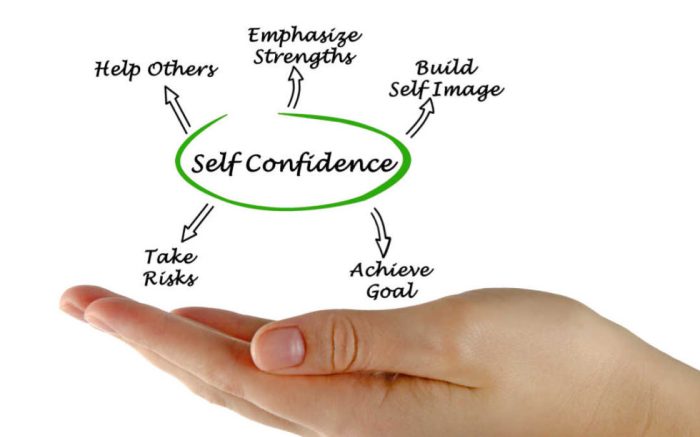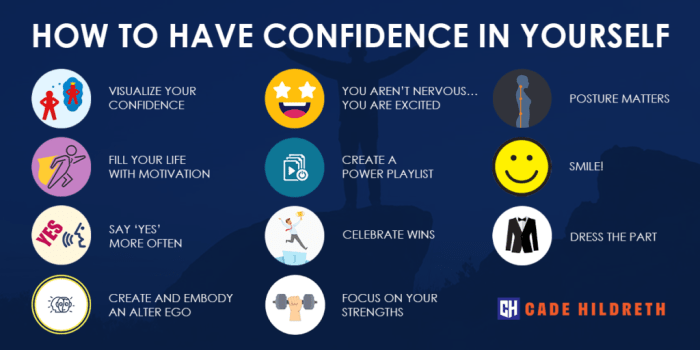Building Self-Confidence starts with understanding your worth and unleashing your potential. As we delve into the depths of self-assurance, discover the key to unlocking a brighter, more confident you.
Explore the journey of self-discovery and empowerment as we uncover the secrets to boosting confidence and achieving personal growth.
Understanding Self-Confidence

Self-confidence is the belief in one’s abilities, qualities, and judgment. It is about trusting yourself to handle challenges, take risks, and pursue your goals without self-doubt.Self-confidence is crucial in various aspects of life as it affects how we think, feel, and act. In personal relationships, self-confidence helps us communicate effectively, set boundaries, and maintain healthy connections. In academic or professional settings, it enables us to speak up, take on leadership roles, and pursue opportunities for growth.Moreover, self-confidence plays a significant role in personal growth and success.
When we believe in ourselves, we are more likely to take risks, step out of our comfort zones, and learn from failures. This continuous cycle of growth and learning leads to greater achievements and fulfillment in life.
Building Blocks of Self-Confidence

Building self-confidence involves various factors that contribute to shaping a person’s belief in their abilities and worth. One of the key building blocks is self-awareness, which plays a crucial role in boosting self-confidence by helping individuals understand their strengths, weaknesses, and values.
Self-Awareness and Self-Confidence
Self-awareness is the foundation upon which self-confidence is built. By being aware of one’s thoughts, emotions, and behaviors, individuals can identify areas for growth and improvement. This understanding allows them to build on their strengths and work on their weaknesses, ultimately leading to increased self-confidence. Self-awareness also helps in setting realistic expectations and goals, as individuals have a clear understanding of their abilities and limitations.
Setting Achievable Goals
Setting achievable goals is another essential building block of self-confidence. When individuals set specific, measurable, attainable, relevant, and time-bound (SMART) goals, they create a roadmap for success. Achieving these goals provides a sense of accomplishment and reinforces belief in one’s capabilities. By breaking down larger goals into smaller milestones, individuals can track their progress and celebrate their achievements along the way, further boosting their self-confidence.
Overcoming Self-Doubt
Self-doubt can be a major obstacle in building self-confidence, but there are strategies to help overcome it and cultivate self-belief. Negative self-talk can have a significant impact on self-confidence, so it’s important to combat it effectively. Additionally, facing fears can be a powerful tool in boosting self-confidence.
Strategies to Overcome Self-Doubt
- Acknowledge your self-doubt and its source.
- Challenge negative thoughts and replace them with positive affirmations.
- Set achievable goals and celebrate your successes.
- Practice self-care and surround yourself with supportive people.
Impact of Negative Self-Talk, Building Self-Confidence
Negative self-talk can erode self-confidence and create a cycle of self-doubt.
Negative self-talk can be damaging to self-confidence as it reinforces limiting beliefs and undermines self-worth. It’s crucial to recognize these negative thoughts and actively work to reframe them in a more positive light.
Facing Fears to Build Self-Confidence
“Courage is not the absence of fear, but the triumph over it.”
Nelson Mandela
Facing fears can be a transformative experience that allows you to prove to yourself that you are capable of overcoming challenges. Each time you confront a fear and emerge stronger on the other side, your self-confidence grows. Whether it’s speaking in public, trying something new, or facing rejection, embracing fear can lead to significant personal growth and increased self-belief.
Practicing Self-Compassion: Building Self-Confidence
Practicing self-compassion is a key component in enhancing self-confidence. When we are kind and understanding towards ourselves, we build a strong foundation of self-worth and acceptance, which in turn boosts our confidence levels.
Techniques for Practicing Self-Compassion
- Practice self-kindness: Treat yourself with the same kindness and compassion you would offer to a friend in need.
- Cultivate mindfulness: Be present in the moment and acknowledge your thoughts and feelings without judgment.
- Acknowledge common humanity: Remember that everyone makes mistakes and faces challenges, it’s a natural part of being human.
- Challenge your inner critic: Replace negative self-talk with positive affirmations and gentle encouragement.
- Seek support: Reach out to loved ones, a therapist, or support group for guidance and validation.
The Importance of Self-Care in Nurturing Self-Confidence
Self-care plays a crucial role in nurturing self-confidence by prioritizing your physical, emotional, and mental well-being. When you take care of yourself, you send a message to your subconscious that you are worthy of love and respect, leading to a more positive self-image and increased confidence levels.